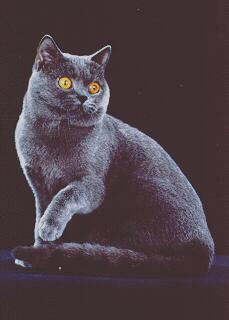
The British Shorthair, probably the oldest English breed of cat, traces its ancestry back to the domestic cat of Rome. This breed was first prized for its physical strength and hunting ability, but soon became equally recognized and valued for its calm demeanor, endurance and loyalty to man.
The British Shorthair was a comparatively rare cat in the United States until about 1980 when it was recognized for championship competition by CFA. Many fine examples of the breed are still imported today from England, Ireland, New Zealand and Australia to help widen the gene pool for breeders in the United States.
The British Shorthair is gaining in popularity every year as it is bred and exhibited by an increasing number of enthusiastic fanciers. Because of its easy-going nature and intelligence, it has become a favorite of animal trainers, and in recent years many examples of these cats have appeared in Hollywood films and television commercials. The British Shorthair is easy to groom and is a playful but no-nonsense cat. He tends to be reserved, in fact typically British by nature, but once he becomes a part of the family he is a devoted cat and undemanding companion.
Although first known as the British Blue, due to the breed's original color, CFA now recognizes the British Shorthair in many different colors and patterns. Please refer to the following Show Standard for details of the breed's colors as well as the desired head and body type and general conformation requirements.
Pricing on British Shorthairs usually depends on each individual kitten's bloodlines, type and applicable markings. Many breeders allow pickup of new kittens between twelve and sixteen weeks of age. At the age of sixteen weeks, kittens have had basic inoculations and developed the physical and social stability to adjust to a new environment. Four months also conforms to the minimum age for showing and transport by air. If a breeder offers you an older kitten or adult cat, don't hesitate; they can be a welcome addition to a home where proper behavior and good manners are needed upon arrival! Neutering or spaying is highly recommended as an altered cat is more suitable as a companion. And, keeping your cat indoors will provide you with a healthier companion and, most importantly, extend the life of your cat.